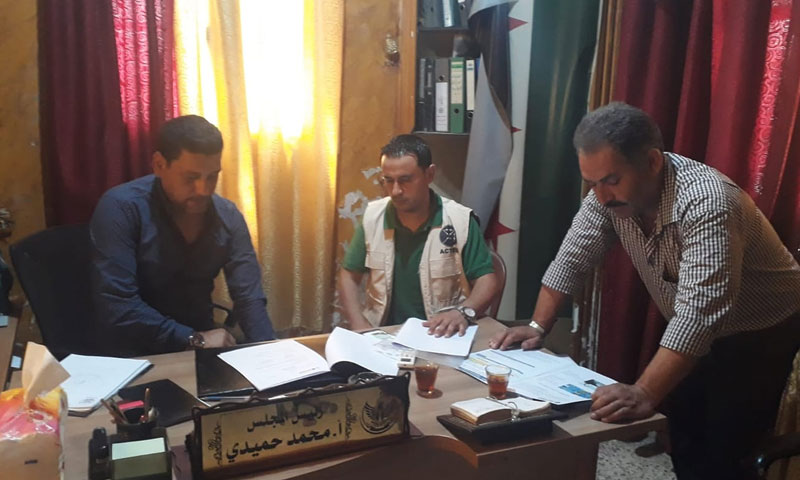In the northern countryside of Aleppo, Dabiq’s local council has launched a service project aimed at providing short term employment opportunities to low-income families in the area, securing the perssons involved a source of livelihood.
The Cash-for-Work project was initiated based on a memorandum of agreement with the French relief organization ACTED, to improve the financial condition of the families in the area, especially those with no financial income, to work in the agricultural and services sectors in the country.
The project, to kick off in early September 2019 and to last for three weeks, comprises seven working hours a day for an average of five days a week, according to Mohammad Hamidi, the head of the local council in Dabiq.
Speaking to Enab Baladi, Hamidi highlighted that the objective of the Cash for Work project is to ensure that many young people have access to basic needs through being tasked with providing public and agricultural services, in return for which they will be having a source of income.
The project will be carried out in two phases. The first phase includes cleaning up and rehabilitating the riverbed of the Qwaik River (Aleppo River), while the second phase is designated to men only; who will essentially engage in cleaning up the streets and public spaces in the town as well as rehabilitating the sanitation system, according to Hamidi.
In accordance with the terms prescribed by the memorandum of agreement signed between the local council and ACTED, the participants, both men and women, are to be aged between 18 and 45 years with no steady income. Plus, the participants should not be beneficiaries of any other organizations within the activity period of the Cash for Work project.
In addition, there are specific selection criteria for the beneficiaries determining the admissions priorities of the project: including elderly-headed household, households with pregnant women or breastfeeding mothers, households with more than six members, or with a child below the age of 18, as well as households with disabled persons and female-headed households.
Hamidi noted that those who got approved and benefited from the Cash for Work project have to forfeit their right to apply for any other project carried out by the organization in the future, such as the World Food Programme (WFP) and others, as to ensure benefit for that largest possible number of households in the area.
The local councils and organizations in the cities and areas controlled by the opposition tend to initiate service projects supported by the Turkish government and other countries, in order to promote the stability of these areas, consistent with a remarkable development at the service levels in general.
This is not the first time the Cash for Work project gets launched, for similar projects were implemented in different cities and towns in Syria’s North over the past years.
A group of local organizations operating in the northern countryside of Aleppo and Idlib countryside invested youth efforts in service projects, where the participants are paid for their services in temporary employment contracts within temporary projects. For example, the organization “Violet” launched a project in August 2018, to construct the asphalt roads in Kafr Nabl town in Idlib countryside, in addition to the restoration of roads, schools, parks and public facilities in some villages around the city.
In early 2018 , the Syrian Center for Humanitarian Care and Development (MASARAT) embarked on the Cash for Work project for women in Ariha city in Idlib governorate, targeting the widows who are the only breadwinners for their families.
The projects included many activities such as sewing pajamas and school bags and wool knitting, and the number of beneficiaries of each project was about 100 women.

